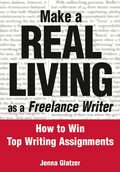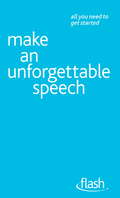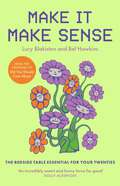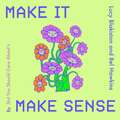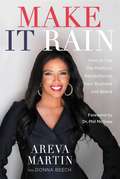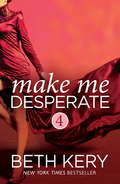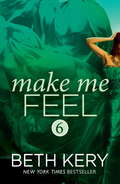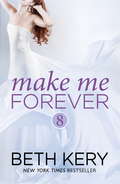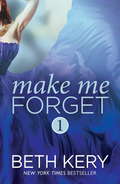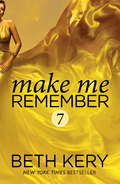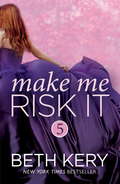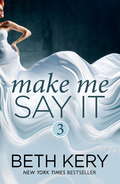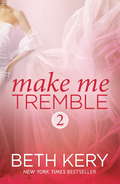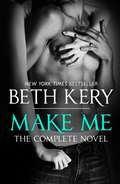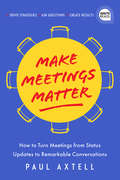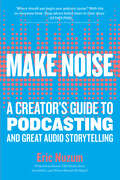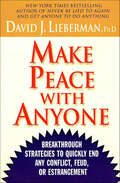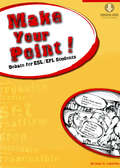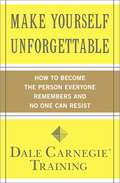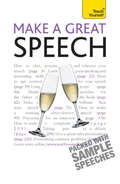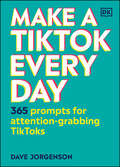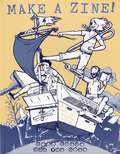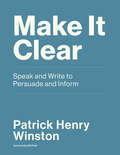- Table View
- List View
Make A REAL LIVING as a Freelance Writer
by Jenna GlatzerStep-by-step instructions on how writers can earn top dollar writing for magazines are provided in this book. Secrets are revealed about what the high-paying magazines really want, how to build relationships with editors, how to ascertain which sections of a magazine are open to freelancers, what kinds of stories are in demand, what to do if a deadbeat publisher doesn't pay up, how to market reprints, and how to become an expert in one's chosen writing field. Basic terms like query, clips, and source sheet are defined for beginning writers, and tips on everything from coming up with an idea to pitching a syndicated column are also included. Writers learn about the little-known sources top freelancers use to find new stories and experts. In addition, they learn how to get their first paying assignments even if they have no prior clips, how to negotiate for better pay, how to find high-paying magazines that aren't swamped with queries, and how to worm their way into editors' inboxes even if their e-mail addresses aren't publicized.
Make An Unforgettable Speech: Flash
by Jackie ArnoldThe books in this bite-sized new series contain no complicated techniques or tricky materials, making them ideal for the busy, the time-pressured or the merely curious. Made An Unforgettable Speech is a short, simple and to-the-point guide to learning the basic principles of a great speech in a few short steps. Whether for a wedding, a presentation or just a special occasion, in just 96 pages you will discover how to master the essential ideas and deliver a captivating and memorable performance, helping you to make a lasting impression with no effort at all.
Make It Make Sense: The Bedside Table Essential For Women In Their Twenties
by Bel Hawkins Lucy BlakistonShit You Should Care About was launched as a WordPress blog by three best friends in the back of a political science lecture. Today it's a global ecosystem of content - two podcasts, 3.5 million Instagram followers and a daily newsy. They are your culture vultures, news agents and (reluctant) agony aunts all rolled into one. MAKE IT MAKE SENSE is a collage of cultural analysis, anecdotes, personal essays, poems, and lists, interplayed like a conversation between friends. So sharp they'll make you wince, so honest that you might feel uncomfortable with what's reflecting back at you, so funny you'll want to take a photo and send it to your best friend.It's the bedside table essential for women who've felt their way through life and want that experience reflected back at them. When everything feels like it's whooshing away in an endless scroll, MAKE IT MAKE SENSE holds the answers (or questions) to what to do with all these big feelings.
Make It Make Sense: The Bedside Table Essential For Women In Their Twenties
by Bel Hawkins Lucy BlakistonShit You Should Care About was launched as a WordPress blog by three best friends in the back of a political science lecture. Today it's a global ecosystem of content - two podcasts, 3.5 million Instagram followers and a daily newsy. They are your culture vultures, news agents and (reluctant) agony aunts all rolled into one. MAKE IT MAKE SENSE is a collage of cultural analysis, anecdotes, personal essays, poems, and lists, interplayed like a conversation between friends. So sharp they'll make you wince, so honest that you might feel uncomfortable with what's reflecting back at you, so funny you'll want to take a photo and send it to your best friend.It's the bedside table essential for women who've felt their way through life and want that experience reflected back at them. When everything feels like it's whooshing away in an endless scroll, MAKE IT MAKE SENSE holds the answers (or questions) to what to do with all these big feelings.
Make It Make Sense: The Bedside Table Essential For Women In Their Twenties
by Bel Hawkins Lucy BlakistonShit You Should Care About was launched as a WordPress blog by three best friends in the back of a political science lecture. Today it's a global ecosystem of content - two podcasts, 3.5 million Instagram followers and a daily newsy. They are your culture vultures, news agents and (reluctant) agony aunts all rolled into one. MAKE IT MAKE SENSE is a collage of cultural analysis, anecdotes, personal essays, poems, and lists, interplayed like a conversation between friends. So sharp they'll make you wince, so honest that you might feel uncomfortable with what's reflecting back at you, so funny you'll want to take a photo and send it to your best friend.It's the bedside table essential for women who've felt their way through life and want that experience reflected back at them. When everything feels like it's whooshing away in an endless scroll, MAKE IT MAKE SENSE holds the answers (or questions) to what to do with all these big feelings.
Make It Rain!: How To Use The Media To Revolutionize Your Business & Brand
by Areva Martin Donna Beech Phil McGrawWhat if you could get in front of millions of prospects with the avid endorsement of famous influencers--without spending a dime?It's happening right in front of you every day. Guest experts on TV, radio, podcasts, blogs, and live streaming are getting local and national exposure for their business and brand that they could never have afforded to reach with ads.For a decade, Areva Martin has used the media to build a huge platform that expanded the influence and power of her brand exponentially. Media appearances on Dr. Phil, Anderson Cooper 360, The Doctors, CNN, MSNBC, FOX, and more have virtually eliminated the need of a marketing budget for her thriving law firm and non-profit organization, while securing her place as one of America's most sought after thought leaders.In Make It Rain! Areva breaks the silence to reveal what insiders know about the power of media appearances to revolutionize a business and brand and get your core message out to the people who need it most. You'll learn how to: Match your brand to the right audience and media venues Craft pitches producers can't resist Jump on breaking news shows Pivot and speak in soundbites like the pros Amplify every interview with social media Turn appearances into platform and become a rainmakerNever before have there been more ways to build a presence that matters. Whether you are the executive of a corporation, the author of an upcoming book, the owner of a rapidly growing small business, or the public face of a local nonprofit or association, if you have a business to build or people you want to help, nothing beats using the media to create the visibility, influence, and power you need. Are you ready to Make It Rain!?
Make Me Desperate (Make Me)
by Beth KeryFrom the New York Times bestselling author of Because You Are Mine and The Affair, comes Make Me - a tantalizing serial novel about hidden pasts, dangerous obsessions, and uncontrollable passion, perfect for fans of E. L. James, Sylvia Day, Jodi Ellen Malpas and J. Kenner. Jacob's addiction to Harper is putting his life's work at risk, but he can't deny himself the pleasure he feels when he's with her. Even when her seeming refusal to acknowledge their past connection makes him doubt her true intentions, he finds himself pushing their affair further, insisting Harper submit to their attraction, even in the most compromising of circumstances.As their encounters become even more lavish, daring, and intimate, Harper aches to break down the walls around Jacob's heart. But she fears his secrets conceal a dark side she's not ready to face. When he suggests a weekend in San Francisco together, she accepts despite her doubts about getting involved with such a guarded, powerful man. There's something about him that keeps her coming back for more. He claims he's obsessed, but she is every bit as compelled...Don't miss the next instalment, Make Me Risk It...Includes a bonus excerpt of Beth Kery's Because You Are Mine.Discover the other captivating titles by Beth Kery: The Affair, the One Night of Passion series, and her bestselling erotically charged series which began with Because You Are Mine.
Make Me Feel (Make Me)
by Beth KeryFrom the New York Times bestselling author of Because You Are Mine and The Affair, comes Make Me - a tantalizing serial novel about hidden pasts, dangerous obsessions, and uncontrollable passion, perfect for fans of E. L. James, Sylvia Day, Jodi Ellen Malpas and J. Kenner. Haunted by the prospect of possessing Harper whenever he can, Jacob deepens his risk, indulging in a passionate escape with her at his Sea Cliff mansion. In their moments of intimacy, there are times when Jacob could swear Harper remembers their shared past, making him wonder if she's purposefully misleading him about forgetting Jake Tharp. But despite his suspicions and increasing worries for her well-being if she does remember that traumatic time, he finds himself falling harder for the woman who has reignited his most savage desires, and his most tender feelings...Harper can't help feeling uneasy even though Jacob has begun to slowly open up to her about his past and his relationship with the beautiful Regina Morrow. There's a mystery to her lover that she can't comprehend, even as she draws alarmingly close to him with each second she spends in his challenging, intoxicating presence. As their days of volatile passion and pleasure in San Francisco draw to a close, she realizes how much she longs for this enigmatic man. Despite her fears about his secretiveness, when he reveals he wants her to stay with him indefinitely in his Lake Tahoe home, she realizes just how strong her need for him has grown...Don't miss the next instalment, Make Me Remember...Includes a bonus excerpt of Beth Kery's Since I Saw You.Discover the other captivating titles by Beth Kery: The Affair, the One Night of Passion series, and her bestselling erotically charged series which began with Because You Are Mine.
Make Me Forever (Make Me)
by Beth KeryFrom the New York Times bestselling author of Because You Are Mine and The Affair, comes Make Me - a tantalizing serial novel about hidden pasts, dangerous obsessions, and uncontrollable passion, perfect for fans of E. L. James, Sylvia Day, Jodi Ellen Malpas and J. Kenner. Unable to hide from Harper any longer, Jacob reveals his painful past, finally acknowledging his long-hidden connection to her. Afraid the truth will drive her away forever, he's surprised when Harper exposes startling facts about her own past.Harper is angry at Jacob for robbing her of someone she'd loved and burying a part of himself she'd forever cherish. Still, when he faces a devastating loss, Harper races to his side. Strengthened by Harper's love, Jacob finally fully bares his soul and reveals everything he has kept hidden. But if they are to have a future together, he will need to release all of his shame - and embrace a happiness they both desperately deserve.Includes a bonus excerpt of Beth Kery's Looking Inside.Discover the other captivating titles by Beth Kery: The Affair, the One Night of Passion series, and her bestselling erotically charged series which began with Because You Are Mine.
Make Me Forget (Make Me)
by Beth KeryFrom the New York Times bestselling author of Because You Are Mine and The Affair, comes Make Me - a tantalizing serial novel about hidden pasts, dangerous obsessions, and uncontrollable passion, perfect for fans of E. L. James, Sylvia Day, Jodi Ellen Malpas and J. Kenner. Harper McFadden has made her name as an investigative journalist by being both compassionate and fearless. After tragedy strikes her family, she moves to the shores of Lake Tahoe to find some peace. But when mysterious software mogul Jacob Latimer comes into her life, her thoughts turn from her own healing to an urgent need to get closer to him...Jacob Latimer is the definition of a self-made man. The software entrepreneur built his corporation from nothing, but rumors abound about the shadiness of his rise to power and no one knows what secrets lurk in his past. Harper is the last person he should let into his life. As an investigative journalist, she's the one person who could expose his hidden origins. But Jacob knows things about Harper's past that make him irresistibly drawn to her. He wants nothing more than to make her his - and Jacob is a man who always gets what he wants...Don't miss the next instalment, Make Me Tremble...Includes a bonus excerpt of Beth Kery's Glimmer.Discover the other captivating titles by Beth Kery: The Affair, the One Night of Passion series, and her bestselling erotically charged series which began with Because You Are Mine.
Make Me Remember (Make Me)
by Beth KeryFrom the New York Times bestselling author of Because You Are Mine and The Affair, comes Make Me - a tantalizing serial novel about hidden pasts, dangerous obsessions, and uncontrollable passion, perfect for fans of E. L. James, Sylvia Day, Jodi Ellen Malpas and J. Kenner. During sun-drenched, passionate days spent on Jacob's yacht, Harper and Jacob fall deeper in love, taking risks not only with their bodies but their hearts. The only thing standing between Jacob and pure bliss is the suspicion that Harper's memories are returning. If they do, she may never see him the same way again - or let him keep her safe from the horror that she faced as a young girl...The sense of security and trust Harper feels with Jacob has her finally abandoning herself to sensual decadence along with the truth that she's hopelessly in love with this dark, daring man. With her submission to her feelings, sad memories and dreams begin to rise to the surface of her consciousness-and hers isn't the only past being unburied. When one of her reporters reveals a startling revelation about Jacob's history, their shared experiences crash together in a way that will change her forever.Don't miss the jaw-dropping conclusion in Make Me Forever...Includes a bonus excerpt of Beth Kery's Wicked Burn.Discover the other captivating titles by Beth Kery: The Affair, the One Night of Passion series, and her bestselling erotically charged series which began with Because You Are Mine.
Make Me Risk It (Make Me)
by Beth KeryFrom the New York Times bestselling author of Because You Are Mine and The Affair, comes Make Me - a tantalizing serial novel about hidden pasts, dangerous obsessions, and uncontrollable passion, perfect for fans of E. L. James, Sylvia Day, Jodi Ellen Malpas and J. Kenner. Harper has had more than her fair share of bad luck with men. Although Jacob treats her royally and she can't resist his challenging sexual demands, his secretive nature makes her worry that he's just like all the rest. When a romantic trip to San Francisco gives her a glimpse into his past, Harper's distrust of powerful men kicks into overdrive. Between his questionable business activities, which Harper's paper wants to expose, and his secretive relationship with another woman, Harper wonders if his intentions are truly noble...Unable to get her out of his head, Jacob takes the risk of exposing part of his painful past to Harper. Even though his fascination with her could be his downfall, Jacob willing to do anything to bind her even closer to him...Don't miss the next instalment, Make Me Feel...Includes a bonus excerpt of Beth Kery's When I'm With You.Discover the other captivating titles by Beth Kery: The Affair, the One Night of Passion series, and her bestselling erotically charged series which began with Because You Are Mine.
Make Me Say It (Make Me)
by Beth KeryFrom the New York Times bestselling author of Because You Are Mine and The Affair, comes Make Me - a tantalizing serial novel about hidden pasts, dangerous obsessions, and uncontrollable passion, perfect for fans of E. L. James, Sylvia Day, Jodi Ellen Malpas and J. Kenner. Even as Jacob offers Harper a life of luxury and indulgence that thrills all her senses, she grows wary of this powerful man and his unquenchable desires. In their most intimate moments, Harper can't help but submit to his seductive demands. But the man outside the bedroom, whose early business dealings carry an air of questionable origins, who refuses to share even the smallest detail about his past, is an entirely different story...Jacob worries that, deep inside, Harper must recognize who he really is - the boy he was before he became a powerful, billionaire mogul. As much as he craves acknowledgment of their shared past, he dreads she might call him out as a fraud and leave his life forever...Don't miss the next instalment, Make Me Desperate...Includes a bonus excerpt of Beth Kery's The Affair.Discover the other captivating titles by Beth Kery: The Affair, the One Night of Passion series, and her bestselling erotically charged series which began with Because You Are Mine.
Make Me Tremble (Make Me)
by Beth KeryFrom the New York Times bestselling author of Because You Are Mine and The Affair, comes Make Me - a tantalizing serial novel about hidden pasts, dangerous obsessions, and uncontrollable passion, perfect for fans of E. L. James, Sylvia Day, Jodi Ellen Malpas and J. Kenner. When Jacob Latimer ran into Harper McFadden on the beach, she thought it was the first time their paths had crossed. Only Jacob knows that his murky history connects with hers in ways she couldn't imagine - ways that make their relationship dangerous. He should let her go. But now that he's felt her in his arms, he worries that he'll never be able to forsake her... Harper has never been this attracted to anyone before - nor has she ever been so intimidated. Jacob can go from aloof and mysterious to total mastery of her mind and body in a second flat. In the glamorous setting of his luxurious yacht, he finally stakes his claim. And he won't stop until he has every inch of her under his delicious control...Don't miss the next instalment, Make Me Say It...Includes a bonus excerpt of Beth Kery's Glow.Discover the other captivating titles by Beth Kery: The Affair, the One Night of Passion series, and her bestselling erotically charged series which began with Because You Are Mine.
Make Me: Complete Novel (Make Me)
by Beth KeryFor fans of E. L. James, Sylvia Day, Jodi Ellen Malpas, J. Kenner and Maya Banks. From the New York Times bestselling author of The Affair and the Because You Are Mine series, Make Me explores hidden pasts, dangerous obsessions, and uncontrollable passion... Harper McFadden established herself as an investigative journalist by being both compassionate and fearless. After tragedy strikes her family, she moves to the shores of Lake Tahoe to find some peace. But when mysterious software mogul Jacob Latimer enters her life, her thoughts turn from her own healing to an insatiable desire to get closer to him...No one knows what secrets lurk in the past of Jacob Latimer. He built his corporation from nothing, but rumors abound about his mysterious rise to power. Harper is the last person he should let into his life. She could expose the truth about his origins. But Jacob knows things about Harper's past that draw him in. He wants nothing more than to make her his - and Jacob is a man who always gets what he wants...For more electrifying romance, don't miss the other captivating titles by Beth Kery, The Affair, Glimmer, Glow, the One Night of Passion series, and her bestselling erotically charged series which began with Because You Are Mine.
Make Meetings Matter: How to Turn Meetings from Status Updates to Remarkable Conversations (Ignite Reads)
by Paul AxtellMeetings should matter.No one wants to be called in for a meeting that could've been an email. No one wants to sit in a meeting where everyone's distracted or talking over each other. If you're going to attend or lead a meeting, don't you want it to...well, matter?Meetings are a chance to initiate a conversation with your teammates. You can communicate information with them that wouldn't have the same hold digitally. You can foster new relationships with your coworkers, and learn from their new ideas and perspectives.So why do so many people dread meetings? Because they're doing them all wrong.Change the way people think about meetings. Transform their opinions by holding a meeting that is efficient and productive, that is open and communicative, that is useful and important.Revolutionize the definition of a meeting. Learn to make them matter.Paul Axtell affirms the importance of meetings, and he redesigns them using the vital foundation of conversation. With real-life examples and actionable advice, he shows you how to design meetings for results, lead them to achieve agendas that move projects forward, and even allow time for building the relationships that make working together in a remarkable way possible. Based on his award winning efficiency training, this book will revolutionize the meeting—moving it from that dreaded obligation to a powerful way to get things done in business and in life.
Make Noise: A Creator's Guide to Podcasting and Great Audio Storytelling
by Eric Nuzum&“An interestingly idiosyncratic and personal vision of how to make podcasts.&”—Ira Glass Veteran podcast creator and strategist Eric Nuzum distills a career&’s worth of wisdom, advice, practical information, and big-picture thinking to help podcasters &“make noise&”—to stand out in this fastest of fastest-growing media universes. Nuzum identifies core principles, including what he considers the key to successful audio storytelling: learning to think the way your audience listens. He delivers essential how-tos, from conducting an effective interview to marketing your podcast, developing your audience, and managing a creative team. He also taps into his deep network to offer advice from audio stars like Ira Glass, Terry Gross, and Anna Sale. The book&’s insights and guidance will help readers successfully express themselves as effective audio storytellers, whether for business or pleasure, or a mixture of both.
Make Peace with Anyone: Breakthrough Strategies to Quickly End Any Conflict, Feud, or Estrangement
by David J. LiebermanMake Peace with Anyone is the first book that shows readers how to quickly resolve any situation, no matter how long it's been going on, or how many people are involved. The techniques and psychological strategies presented here are simple, easy to understand, and work...fast. In this book readers will learn how to:*End any family feud*Get an apology from anyone*Jumpstart any relationship or friendship*Handle any passive-aggressive person*Get the respect you deserve from anyone*Dramatically improve any relationship*Get anyone to forgive you for anything*Align anyone to your way of thinkingDr. David J. Lieberman provides the path to permanent peace and will show you the way to Make Peace with Anyone.
Make Your Point!: Debate For Esl/efl Students
by Michael H. LubetskyThis valuable workbook and downloadable audio can turn any ESL student into an accomplished debater! Make Your Point! opens the world of formal debate to the English learner. Debate fundamentals are taught form the first chapter in a student-centered format suitable for large and small classes alike. Each of the ten chapters offers a "language focus" and a "debatable focus. " As students learn new debate skills, they also build important language skills. All task chains integrate speaking, listening, reading and writing activities. Most activities are intended for pairs and small groups. Neither the learners nor the teacher needs any prior debate experience to use this text successfully. This debate course promotes other forms of oral communication—such as discussion, recitation and speech-making—as well as more general activities, such as summarizing and taking notes.
Make Yourself Unforgettable: How to Become the Person Everyone Remembers and No One Can Resist (Dale Carnegie Books)
by Dale Carnegie TrainingFrom one of the most trusted and bestselling brands in business training, Make Yourself Unforgettable reveals how to develop and embody unforgettable qualities so you can become the effective and desirable colleague and friend possible.Learn how to develop and embody the ten essential elements of being unforgettable! What does it really mean to have class? How do you distinguish yourself from the crowd and become a successful leader? When should intuition guide your business decisions? The answers to these and other important questions can be found in this dynamic and inspiring guidebook for anyone looking to lead a life of greater meaning and influence. In Make Yourself Unforgettable you can learn the secrets to making a positive, lasting impression, including: · The six steps to managing communication problems · The four unexpected stumbling blocks to ethical behavior and how to avoid them · A new way to understand and exude confidence · Techniques for building resiliency and preventing fear · The five key social skills that identify someone as a class act Once you discover how you can naturally and effortlessly distinguish yourself, you’ll quickly find people in all areas of life responding to you more positively and generously than ever before.
Make a Great Speech: Teach Yourself (Teach Yourself General)
by Jackie ArnoldWritten by a professional toastmaster, keynote speaker and voice coach, this book gives you all you need to make an effective speech on any occasion. From weddings and christenings to fundraising events and after-dinner speeches, it offers suitable material for any occasion, with practical techniques and strategies for everything from using props to conquering stage fright and banishing your butterflies forever. Teach Yourself - the world's leading learning brand - is relaunched in 2010 as a multi-platform experience that will keep you motivated to achieve your goals. Let our expert author guide you through this brand new edition, with personal insights, tips, energising self-tests and summaries throughout the book. Go online at www.teachyourself.com for tests, extension articles and a vibrant community of like-minded learners. And if you don't have much time, don't worry - every book gives you 1, 5 and 10-minute bites of learning to get you started. - Gives you a comprehensive source of advice, material and techniques for wedding speeches - Offers hints on how to speak effectively and conquer your butterflies - Features practical guides to making the most of props and technology
Make a TikTok Every Day: 365 Prompts for Attention-Grabbing TikToks
by Dave JorgensonLife is short and so are TikToks, so what are you waiting for? Release your creativity with these 365 TikTok ideas.Making a TikTok video that goes viral is all about having a quirky idea that can grab attention in as little as 15 seconds. Whether you're a TikTok beginner or a practiced creator, the hardest part is often getting started. This unofficial book provides a year's worth of ideas in the form of creative prompts to keep you posting new videos every day. Give the weather report using the app's Green Screen effect.Use forced perspective and a coffee mug and make a splash as you dive in.Dance with your dog.Say nice things to a houseplant and see if it grows faster.Kick-start a new meme by creating a TikTok that people will want to "duet" with.There are tips and advice from the most popular creators, including the queen of Alt TikTok, Melissa Ong, wholesome TikTok family The McFarlands, and fashion favorite Jeffery Dang, who provide insight into their experience on the app and how they got started as creators.
Make a Zine: When Words and Graphics Collide
by Joe BielIn Microcosm's DIY guide to zine-making, editors Bill Brent, Joe Biel, and a cast of contributors take you from the dreaming and scheming stages onto printing, publication and beyond! Covering all the bases for beginners, Make a Zine! hits on more advanced topics like Creative Commons licenses, legality, and sustainability.<P><P> Illustrated by an army of notable and soon-to-be-notable artists and cartoonists, Make a Zine! also takes a look at the burgeoning indie comix scene, with a solid and comprehensive chapter by punk illustrator Fly (Slug and Lettuce, Peops.) Part history lesson, part how-to guide, Make a Zine! is a call to arms, an ecstatic, positive rally cry in the face of TV show book clubs and bestsellers by celebrity chefs. As says Biel in the book's intro, "Let's go!"
Make an Unforgettable Speech: Flash
by Jackie ArnoldThe books in this bite-sized new series contain no complicated techniques or tricky materials, making them ideal for the busy, the time-pressured or the merely curious. Made An Unforgettable Speech is a short, simple and to-the-point guide to learning the basic principles of a great speech in a few short steps. Whether for a wedding, a presentation or just a special occasion, in just 96 pages you will discover how to master the essential ideas and deliver a captivating and memorable performance, helping you to make a lasting impression with no effort at all.
Make it Clear: Speak and Write to Persuade and Inform
by Patrick Henry WinstonThe essentials of communication for professionals, educators, students, and entrepreneurs, from organizing your thoughts to inspiring your audience and ensuring what you say is remembered.Do you give presentations at meetings? Do you ever have to explain a complicated subject to audiences unfamiliar with your field? Do you make pitches for ideas or products? Do you want to interest a lecture hall of restless students in subjects that you find fascinating? Then you need this book. Make It Clear explains how to communicate--how to speak and write to get your ideas across. Written by an MIT professor who taught his students these techniques for more than forty years, the book starts with the basics--finding your voice, organizing your ideas, making sure what you say is remembered, and receiving critiques ("do not ask for brutal honesty")--and goes on to cover such specifics as preparing slides, writing and rewriting, and even choosing a type family.
